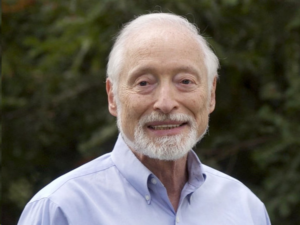Edgar Cahn (Biography)
 Edgar Cahn (B.A., Swarthmore College, 1956; M.A., Ph.D., Yale University, 1960; J.D., Yale Law School, 1963), was an author, speechwriter, law school founder, professor, and visionary architect of legal strategies to empower the poor and foster social change. Of his numerous articles, The War on Poverty: A Civilian Perspective, 73 Yale L.J. 1317 (1964), co-authored with his late wife, Jean Camper Cahn, is best known. Sargent Shriver, Director of President Kennedy's Office of Economic Opportunity, credited this article as the "genesis of legal services". Recognized as the blueprint for the National Legal Services program (which annually provides free legal services to indigent clients across the nation), it is one of the most cited Yale Law Journal's articles of all time. Its central theme – that a War On Poverty would only succeed if policymakers listened to the voice of the poor and provided for their active participation in social programs - is as relevant today as when it was written two generations ago.
Edgar Cahn (B.A., Swarthmore College, 1956; M.A., Ph.D., Yale University, 1960; J.D., Yale Law School, 1963), was an author, speechwriter, law school founder, professor, and visionary architect of legal strategies to empower the poor and foster social change. Of his numerous articles, The War on Poverty: A Civilian Perspective, 73 Yale L.J. 1317 (1964), co-authored with his late wife, Jean Camper Cahn, is best known. Sargent Shriver, Director of President Kennedy's Office of Economic Opportunity, credited this article as the "genesis of legal services". Recognized as the blueprint for the National Legal Services program (which annually provides free legal services to indigent clients across the nation), it is one of the most cited Yale Law Journal's articles of all time. Its central theme – that a War On Poverty would only succeed if policymakers listened to the voice of the poor and provided for their active participation in social programs - is as relevant today as when it was written two generations ago.
As a speechwriter for U.S. Attorneys Robert F. Kennedy, Nicholas Katzenbach and Supreme Court Justice Arthur Goldberg, Professor Cahn led efforts to redefine the role of lawyers to empowering clients, as well as representing them. With publication in 1968 of Hunger, USA, and litigation he led, Professor Cahn initiated the preeminent exposé of hunger in America and a national drive to end it. In 1969 he published Our Brother's Keeper: The Indian in White America which led to ending the government policy of termination of American Indian nations, advancing the right of self-determination, and enacting Public Law 93-638, the American Indian Self Determination Act.
With his first wife, the late Jean Camper Cahn, he co-founded the Antioch School of Law, (now UDC David A. Clarke School of Law) - the first law school nationally to educate students primarily through clinical training in legal services to the poor. Clinical experience is now required in all accredited law schools in the United States. Co-deans from 1971 to 1980, the Cahns received the Association of American Law School's William Pincus Clinical Award for "Outstanding Contributions to Clinical Legal Education."
Seeking to engage the poor in promoting systems of self-help in the late 1980s, Professor Cahn began the Time Dollars project, a service credit program now operating in 70 communities in the United States, and across the world with registered programs (www.timebanks.org). “Time Dollars” are currency for a participatory economic strategy enlisting civic service for others. It is described in his books, Time Dollars (1992) and No More Throw-Away People: The Coproduction Imperative (2004). Co-production allows poor citizens to become active agents of self-help. Dr. Christine Gray, Professor Cahn’s second wife, has been instrumental in expanding the reach of these ideas and together they taught and presented across a wide spectrum of audiences. Dr. Gray is continuing her work in these areas and will be joining us at the Cahn event in Swarthmore in October.
In Washington, D.C., Professor Cahn founded the Time Dollar Youth Court, in which teen juries diverted teens from the formal juvenile justice system for non-violent offenses. The Court, initially housed at UDC Law, heard 15 cases a week and 800 per year. Professor Cahn viewed youth courts as a prototypical example of co-production and a way to block the school to-prison pipeline. In 2010, in the aftermath of the “kids for cash” judicial scandal, he called upon the Pennsylvania General Assembly to conduct public hearings to explore alternatives to juvenile detention - like youth courts.
Many of us are fortunate if we can point to one major accomplishment in our career. The number and impact of Professor Cahn’s contributions to a more just society are so stunning that they are difficult to quantify and appreciate. His achievements are legendary within the field of public interest law but few in American society know of his successes, though they ripple through our land daily. Even the organized bar, the judiciary, and policy makers know far too little of his work. Recognizing his contributions publicly, as we do through the Cahn Collaborative, will help ensure that youth courts, system change, and co-production benefit future generations of youth, professionals, justice advocates and society at large.
Join us as a sponsor for the The Cahn Collaborative
